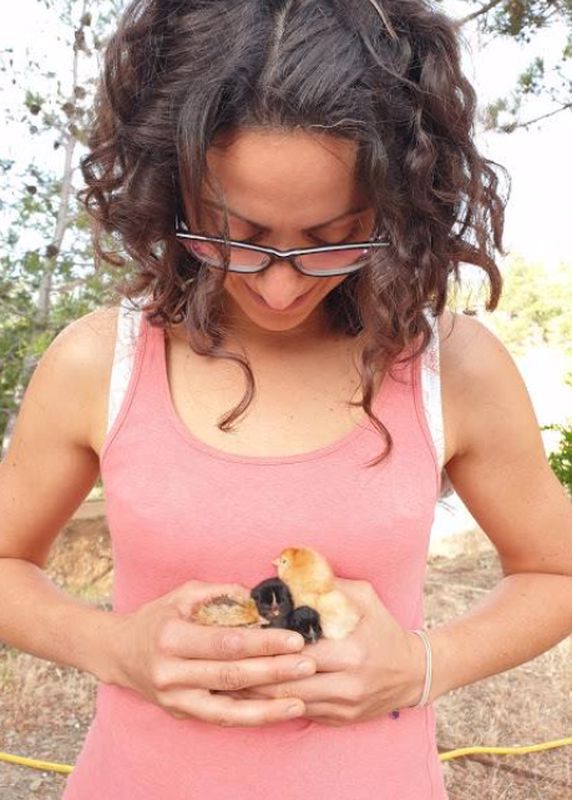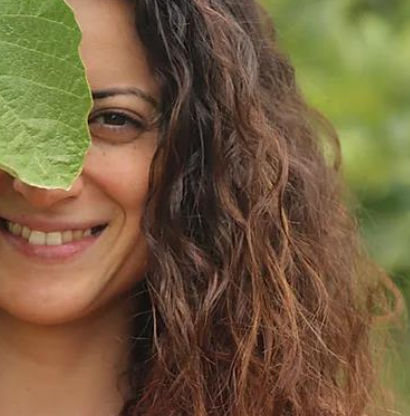Interview by: Anna Michael, annamichael.cardet@gmail.com
Key Account Manager at YOUTHShare COOP Training Placement Centre, Cyprus
YOUTHShare aims to support youth by increasing their potential for employment, amongst else, in local sharing economies. Through our journey, we will connect the dots and share stories of young active people who have set innovation paradigms in the sector of local sharing economies. Creating one’s ownpath in innovative fields pass through inspiration and motivation from peers.
Sophia Matsi, is the shiny case of a person following an innovative approach to local sharing economies. By cultivating her own garden in a sustainable way, she managed to adopt a healthier lifestyle and to become an economically independent person.
Taking a closer look at Sophia’s case, one can understand how innovation and entrepreneurship in sustainable sectors of economy may alter their life in a positive and productive way.
One of the greatest messages that Sophia shares is for one to see beyond a plate of food; to consider where the food comes from and to appreciate the effort that was made until this plate reaches the table.
As she mentioned in one of her talks “Like the seeds, humans hold tremendous amount of power inside. I know now that each choice we make from the food we eat, the clothes we wear, the way we commute to work every single day, each choice has an impact on how the world forms around us”
The interview with Sophia offers a completely new perspective.
– What is permaculture and how did it change your life?
A simple definition for permaculture is that it’s the science of design used to create resilient and regenerative natural and human ecosystems by observing and mimicking natural patterns. Permaculture has three fundamental ethics: care of the earth, care of the people and future care. Permaculture is about regenerating degraded plots of land and reintroducing lost biodiversity, it’s about creatingregenerative gardens and producing high-nutrient organic food while enhancing soil fertility, it’s aboutdesigning self-reliant communities on water, energy and food as well as creating resilient businesses that profit while solving environmental challenges. What captured my attention about permaculture is how this system of design requires one’s outmost attention and attuned observation with the surroundings, tapping into more intuitive sides of ourselves, implementing scientifically proven methods and techniques as well as using advances in technology, resonating with a more systematized and data based method of thinking and acting. To me it’s a way of living that combines on the one hand my natural incline towards creativity and on the other simultaneous need to lean over scientific data for reassurance and backing up my choices.
Permaculture completely transformed my life connecting all the dots together: It came at a stage when I most needed it – where frustration for environmental degradation and uncertainty for what is the best way to act, was simply unbearable. The trainings and practicalities in permaculture gave me the reassurance that this is the best and most efficient way to act. The knowledge, the people and the living examples I experienced these last 6 years have simply kept the fire going, to the point that I have directed my life and occupation to resonate with the principles and ethics of permaculture.
– What were some of the challenges you have faced?
Challenges emerged since day one of choosing to live with a permaculture mindset: I had to give up on choices that were not the most environmentally sound and respectful, such as dropping the use of my favourite commercial chemically-based cleaning products and cosmetics or deciding to spend a bit more money on ethically sourced clothing and products in general rather than supporting cheap labour mass production firms. Of course the challenges in my gardening attempts is something that never seizes to exist: a plant dies for unknown reasons, the potting mix used was not right, the trees were pruned wrongly, the available irrigation water is just not sufficient. A common denominator in all these, is lack of knowledge, lack of experience and lack of funding. Many
times, I realize that the resilient answer to a challenge is a project that would cost me 10.000 Euros or a method that no one has applied or can teach me here in Cyprus. To be able to progress in my personal permaculture projects and overcome challenges I now understand that I need to invest time and most of the times money. What I have realized though these last couple of years is how proper planning and realistic acting strategy can get me there.
– How is Petrera Land making an impact?
The goal of Petrera is to become an educational demonstration centre where permaculture principles and ethics are applied for the land’s design and constant amelioration. It’s the place where we harvestand save our water and energy, produce our food, create soil and enjoy living the outdoors. Petrera also aims to educate those interested in natural living and many times we’ve organized educational experiences where people who join the action receive instructional guidelines and then get a hands-on experience. Organizing nature-connection events such as the annual running event “Run for Seeds” isanother priority of Petrera. We’ve been organising this race for the last two years with the aim of bringing awareness to the significance of saving and using our heirloom and open-pollinated seed varieties. According to seasonality and the each-time open project we also welcome people interested to volunteer and learn while doing, whether it’s preparing regenerative vegetable beds, turning the compost, setting up wicking beds or building a compost toilet. Slowly but steadily the goal is to become a bright example of how resilient and self-reliant one can become by applying permaculture principle to the design of one’s land and life and we hope to inspire more people to go back home and do the same and much more, shaking and transforming bit by bit our current reality.
– Considering that Permaculture is an innovative approach to local sharing economies. What message would you like to share with your peers/ young generation regarding alternative ways of employment?
This is the time to create alternative models of food production, communities and economies as it is obvious that the current model of fossil-fuel powered, mass-production, fast-paced lifestyle is not serving neither us nor our environment anymore. There are some spectacular examples of regenerative businesses running out there based on permaculture ethics and principles and these are examples of people who are financially thriving while caring for people and the earth. Business such as restoration of degraded pieces of lands through silvopasture and alley-cropping agroforestry systems, small-scale high yielding mushroom enterprises or online farmers markets – are examples of contemporary projects happening right now, ideas being born by the necessity of making a living in an ethical way by following one’s passion of respectful acting and reacting with the earth. You can find lots of inspiration and exposure to projects like those at Diego Footer’s Permaculture Voices podcast and Scott Mann’s Permaculture Podcast.
 – What does it take to start following your passion?
– What does it take to start following your passion?
Guts. Even though I would argue that it takes more energy and patience out of you when you stick around and work with things you are not passionate with. When you follow your passion, many times the road gets dark and unknown and no-one can promise you a success story. But that’s the sweet part:because the path has never been walked again it means you get to create a story that is unique and the most appropriate to you and to your surroundings. Living innovative lives though is not always possible to all of us and at any time of our lives: sometime it depends on where you are at life and what you risk when you cancel your previous lifestyle and follow your passion. What I have seen as prerequisite to follow your passion for living, is to learn how to plan properly, be fearless while acting and being patient with failure because as Nelson Mandela said: “Don’t judge me by my successes. Judge me by how many times I fell down and got right up.” Be persistent and show faith and with understanding and acceptance you will get to your destination, but in the meantime – don’t overstress about the end result. Enjoy the ride and enjoy the process of learning while doing and becoming better by trying again and again.
– How do you see yourself and Petrera Land in a few years from now?
I see Petrera becoming a green paradise of abundance, resilience, and regeneration. A place that thrives in abundance of food, biodiversity and resource regeneration. I see Petrera being visited by folks who want to bring the change in a Mediterranean semi-arid landscape and also being a host of manyvolunteers who want to visit, stay and get to live the permaculture life. I see the “Run for Seeds” racebeing annually organized, and each year growing in participations, happenings and impact. A series of workshops and events will also run at Petrera and internships will be available for those interested to work close with us and learn by doing for an extended period of time.
– What are your next events? (anything that you would like to invite people)
We had several events lined up, but due to current situation everything has been postponed. What I promise, though, is that a series of weekend and day-long permaculture instruction workshops are coming up, one of them being the basic seminar on permaculture design: a PDC (Permaculture Design Course) taught by locals, to locals taking in mind farming and gardening challenges of Cyprus and the Mediterranean region. Stay tuned through our websites and Facebook pages.
– What are your three favourite words?
Observation
Regeneration
Appreciation
– How can someone reach you out?
If you are interested to find out more about Petrera, past and future actions, tune in with our site at:www.petrera.land. You can also find out more about permaculture and various projects and educationalexperiences we’ve organized in Cyprus with my permaculture partner Gabriel through our website:www.permaculturedesigns.com. Whether you are interested in a permaculture design consultation orjust want suggestions for reading, listening and watching permaculture inspired themes, then that’s thesite to go to. You can also always write to us at: permaculturedesignscyprus@gmail.com and subscribe to our website for all upcoming updates.
Wishing you all health and strength and may your next steps be inspired by awareness and connection with your surroundings.
For more check out Sophia’s TED talk below:
https://www.youtube.com/watch?v=Ww4JUIQ8xKg&feature=emb_title


